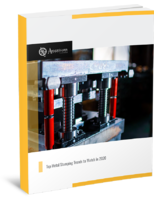Is Vendor Managed Inventory (VMI) Worth it for Class "C" Parts?
Class "c" components are all those high-volume – low-value parts that are a pain in the neck to manage. You know, the tons of bolts, screws, nuts and fasteners your plant uses every day. If it's your responsibility to make sure you have the right part, in the right place, at the right time, make sure you're not spending a dollar to chase a dime. Vendor Managed Inventory (VMI) can save you a lot of time and money — as well as a lot of sleepless nights.
In fact, the higher the volume of class "c" components you're responsible for, the more VMI, or a supply chain specialist, makes sense for you.
They'll own the inventory.
For starters, a VMI supplier will take ownership of your parts inventory. They'll actually have skin in the game. For you, that's a very good thing.
As profit margins come under increasing pressures, it is critical that you eliminate excess inventory waste from your supply chain. A Vendor Managed Inventory specialist will not only own and be responsible for the inventory on your site or warehouse — they will own it and be responsible for it until you actually use it in manufacturing. Think that would take a little weight off you mind?
This way of working gives a huge incentive to the VMI supplier to keep inventory buffers as low as possible. When that is coupled with other tools and procedures, you're talking real savings.
Obsolescent parts will be a thing of the past.
A VMI supplier will also help you control parts obsolescence. It's no secret that obsolete stock plays havoc with warehouse utilization, and increases the amount of inventory being stored for no real reason. Yep, that's expensive, too. Because the VMI supplier knows what and how much of a part is being used on the production line, obsolescence issues can more quickly be identified and corrected.
Next step.
There are several excellent supply-chain and VMI specialists to choose from. One well worth considering is ASF Components. They're family owned so they can be flexible, and they're big enough to have the muscle needed to provide cost efficiencies in procuring the amount of class "c" components you require. For now, the next part is up to you.




